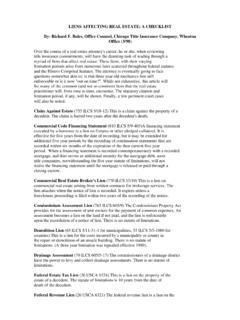Transcription of Implementing Informed Consent - wvbec.org
1 1 5999 Stevenson Ave. Alexandria, VA 22304 / / (fax) Implementing Informed Consent As a service to members, the American Counseling Association has partnered with Robert J. Walsh, NCC, LCPC and Norman C. Dasenbrook, LCPC, who have over 50 years combined experience in the mental health field (including over 30 years in private practice) and are consultants in counseling practice management, to offer a series of bulletins on various private practice topics. This series includes timely information on starting/expanding/ending a private practice, Informed Consent , HIPAA requirements, managed care and insurance companies, and strategies for enrolling on provider panels and responding to claim denials. The material presented is copyrighted and should not be reproduced without the permission of the American Counseling Association. Walsh and Dasenbrook have co-authored, The Complete Guide to Private Practice for Licensed Mental Health Professionals 3rd edition.
2 Their Guide contains the latest information on marketing, advertising, office procedures, dealing with managed healthcare and insurance billing. It also contains a CD-Rom with all the forms necessary for your practice. The Guide can be purchased through their web site at For more information you can contact the authors at 3703 N. Main St. Suite 100 Rockford, IL. 61103 American Counseling Association Dedicated to the growth and development of the counseling profession and those who are served Proudly serving the counseling community for over 50 years! 2 Informed Consent When a client enters into a counseling relationship, the counselor is obligated to provide the information necessary for the client s Informed Consent . All codes of professional counseling ethics require this Informed Consent and many state practice laws mandate it. The Informed Consent advises the client of the counselor s policies, state and federal laws, and clients rights. A signed copy of this form should be kept in the client s chart, and a copy should available to the client upon request.
3 Counselors may choose to post a copy of their form in the waiting room. Informed Consent documents can take many forms, but certain information is crucial so the client can truly give his Informed Consent , and the counselor can comply with state laws and code of ethics. This document protects the client and the counselor. Not only does this document inform the client, it also welcomes and introduces the client to you and your practice. Do not forget that clients entering counseling for the first time are usually anxious and do not know what to expect. While the form is a legal document, Informed Consent should also be inviting, reassuring, and easily understood. This document is read and signed before the client begins therapy, so it can set the tone for that initial session. In our Informed Consent we like to include the following header: Thank you for choosing Norman C. Dasenbrook, MS, LCPC. Today s appointment will take approximately 45 50 minutes. We realize that starting counseling is a major decision and you may have many questions.
4 This document is intended to inform you of our policies, state and federal laws and your rights. If you have other questions or concerns, please ask and we will try our best to give you all the information you need. In the body of the document you should include information about yourself. Some states require that you include your degrees and educational background, licensure, and your treatment approach and philosophy. Some states require information on the potential benefits and risks of counseling, purpose of treatment, the right to participate in and refuse treatment, and how to contact the state s licensing board should the client wish to complain. South Carolina requires a statement explaining that sexual contact between counselor and client is strictly forbidden. It pays to know your state laws. Other areas to cover in the Informed Consent are as follows: IDENTIFING INFORMATION: Spell out who you are, what you are, and where you are. Include the name, title, and business address and phone number of the clinician providing the service.
5 Don t only use the name of the practice, Counseling Center of _____, or Jane Doe and Associates. Counselors are required to list name, title, licensure, business address and phone. Moreover, including highest degree earned, schools attended and treatment approach helps orient the client. 3 CONFIDENTIALITY: Give your confidentiality policy regarding verbal communication, clinical records, and/or psychotherapy notes as needed to conform to state and federal law. Most confidentially sections advise that client information shared with you is confidential, except in the following circumstances. Diagnosis and dates of service shared with the client s insurance company (if billing insurance) to collect payments.* Mandated reporting of physical or sexual abuse of children. Threats of suicide or homicide. Cases where the clients signs a release of information. Information necessary for supervision or consultation. Information released as outlined in the HIPAA Notice of Privacy Practice (if you are HIPAA compliant).
6 Those required by law. Provide a line where the client signs and dates it. EMERGENCY SITUATIONS: Your Informed Consent document needs to outline for your clients what they need to do should an emergency arise outside of your normal business hours. Moreover, if you are a managed health care provider, these entities require you to have a protocol in place for emergencies. This protocol can take many forms: Advising clients to call 911, or whatever emergency services are available in their communities. A special telephone number to call ( pager, cell phone, or answering service). Advising clients to go immediately to the nearest emergency room. Whatever your protocol is, the client needs to be Informed in writing before an emergency occurs. Your emergency protocol needs to conform to your states guidelines or be equivalent to what other clinicians do in your area (community standard). At the end of this section, include a line where the client signs and dates it.
7 4 FINANCIAL ISSUES: This section of your Informed Consent document can be really straightforward or multi-faceted. Either way, clients need to be advised in writing before counseling begins what you charge and how it is collected or paid. Some clinicians are out of pocket only, meaning that the client is charged a certain fee for a certain service and pays at the time of service himself. No insurance or third party payor is billed. A service is performed and payment is made when that service is rendered. Few practices are like this because more and more clients want to use their insurance benefits to pay for all or part of counseling services. If you elect to bill insurance (regular indemnity, not managed care) on behalf of the client, you have to inform the client that you will do so, and whether the full fee or partial fee (what the insurance doesn t cover) is due at the time of service. Moreover, you need to inform the client of your policy if the insurance has an unmet deductible, or denies payment based on lack of medical necessity or your licensure etc.
8 If you elect to participate in or contract with managed health care companies (we encourage you to do so), you have the responsibility to inform your client about fees. When you contract with managed care companies, read the contract. Included in the contract will be a fee schedule, usually lower than your usual and customary fee. Contracts also tell the client s co-pay (the percentage or portion of the contracted rate that the client is responsible for). You can only collect from the client that co-pay amount. You cannot request your full fee or full contracted fee, as that is a violation of your contract with that managed care company. You can only collect the co-pay amount from the client and wait to be paid the remainder by the managed care company. Many counselors starting a new practice ask about a sliding fee schedule. Be cautious! Sliding fee schedule is difficult to administer fairly. There are numerous not-for-profit counseling organizations where people can access needed services at a lower rate.
9 However, if you elect to offer a sliding fee schedule, how you arrive at a certain fee needs to be communicated in writing. With all these variables in fees, co pays, deductibles, managed care rates, and collection guidelines, what do you do in the Informed Consent document? We are now recommending you include the following: Whether or not you will bill third party payors. What is due at the time of service ( co pay, 50% of the fee, or full fee). Whether you charge interest on unpaid balances. (If you do, when does it start and what is the APR?) 5 For unpaid balances, do you use a collection agency? If so, clients need to be Informed that not only do you turn them over to collections, but that they are responsible for any collection fee charged to collect the debt owed. (Check your state laws before contracting with a collection agency as this may violate confidentiality). If you do bill insurance and collect partial payment from the client you need to have a statement that says, We ask that every client authorize payment of medical benefits directly to Jane Doe and Associates.
10 * Missed appointments policy. If you charge for late cancellation or missed appointments, what are the time frame and the amount? Usually it is 24 hours before the appointment and a portion of the fee or full fee. If your fee schedule is not embedded in the body of the financial section (we use a separate fee form), you need to include the sentence I have received a copy of my fee schedule. At the end of this section provide a line where the client signs and dates it. COODINATION OF TREATMENT: We recommend in the Informed Consent you request permission from the client to inform the client s Primary Care Physician and/or Psychiatrist that you are treating the client. This section must conform to all the criteria that a normal release of information needs in order to be valid. A check-off box is needed to indicate whether the client agrees or declines. Again check your state laws. As part of our licensure in Illinois, we are required to ask the client to inform the Primary Care Physician of our treatment.




